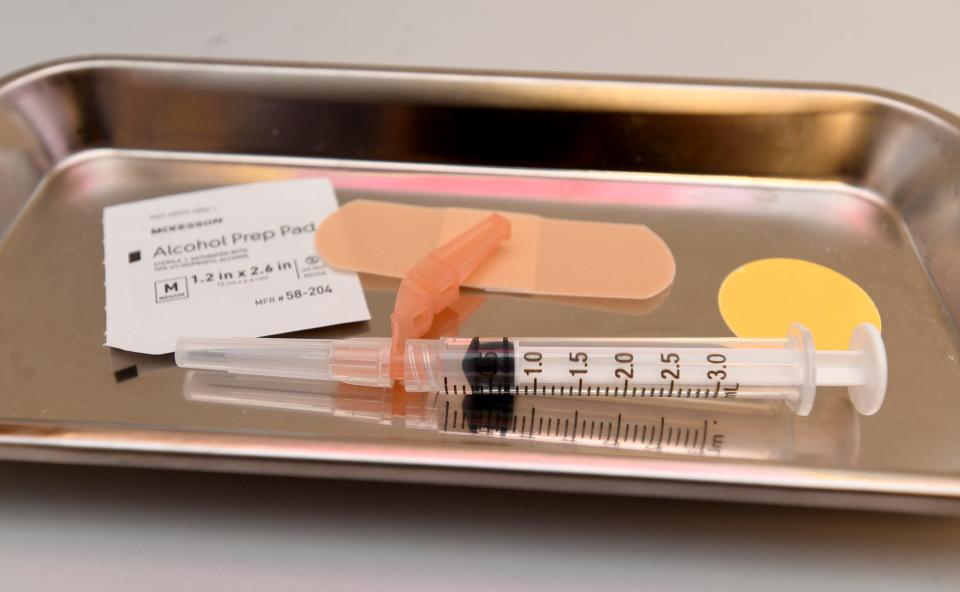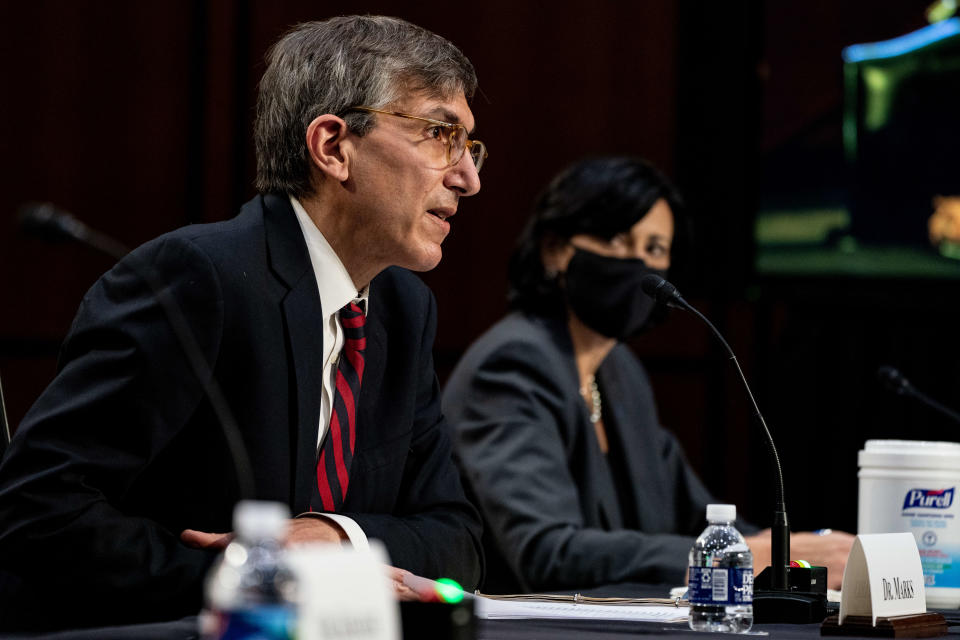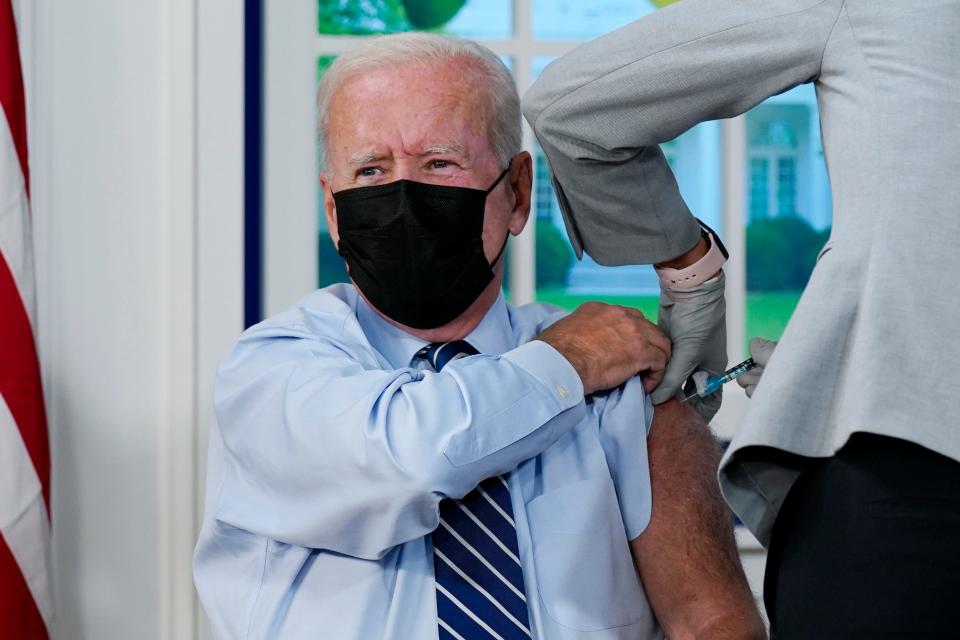COVID-19 booster shots and breakthrough infections: Your questions answered
- Oops!Something went wrong.Please try again later.
Any adult who received a Pfizer-BioNTech or Moderna COVID-19 vaccine at least six months ago is eligible for a booster, as is any adult who received the single-shot Johnson & Johnson vaccine at least two months ago
The Food and Drug Administration authorized the booster shots Friday for anyone who wants one, loosening restrictions imposed this fall. A federal advisory panel and the director of the Centers for Disease Control and Prevention followed suit, recommending that everyone 50 and over get a booster and allowing younger people to get one.
The Biden administration pre-purchased enough doses to continue providing COVID-19 shots for free, and major drugstores made boosters available immediately.
USA TODAY spoke about boosters with Dr. Peter Marks, head of the FDA division that has been reviewing vaccines during the pandemic.
Here's what you should know:
Why should people get a booster?
What we are seeing and what we’ve seen over the past few months is that protection against COVID-19 is starting to wane. It’s probably most significant in the older portion of the population, but it’s also probably in younger people as well.
If you’re going to get a booster, that’s going to help bring your level of immunity back to where it was after your second vaccination with mRNA vaccines (made by Moderna and Pfizer-BioNTech) to a level that will protect you certainly against severe forms of COVID-19 but also against mild forms of COVID-19.
Behind the historic US vaccine effort is FDA's Peter Marks: The job is 'not for the faint of heart.'
How urgent is the need for boosters?
I think (adults) should go ahead and make an appointment to get boosted.
We are in a period where we’re seeing another spike in cases of COVID-19. There’s probably going to be a bunch of COVID-19 circulating for a little while, and we’re going to have the holidays coming up.
The good news is (if you're vaccinated) you probably had a low likelihood of getting severe COVID-19 that would land you in the hospital, but you don’t want a case of breakthrough COVID-19. It takes you out of work, it makes you have to isolate. Also it still can be associated with the development of "long COVID."
Will getting a booster help people avoid lingering symptoms from COVID-19?
We’re really appreciating now how serious long COVID can be, (limiting) people’s ability to do what they like to do potentially for months after having COVID.
There is data which suggest that the rates of long COVID if you are vaccinated are roughly half of that if you are unvaccinated, so it does help to be vaccinated. If you get a booster, hopefully that again prevents that from happening.
How long do boosters take to offer a benefit? Would some who get a booster be protected in time for Thanksgiving?
It takes at least seven days for the booster to really have effect.
That being said, it’s not necessarily what’s going to happen on that day; it’s the fact that post-Thanksgiving there’ll be cases going up – getting a booster anytime is probably a good time.

Mixing vaccine brands is allowed, so which vaccine should people get as a booster?
Whichever one you can get. There’s no best. If you’re 18 or older, and you were vaccinated two months or more ago with (the Johnson & Johnson vaccine) or six months ago for Pfizer or Moderna, just go get a booster.
Some research suggests that people who got J&J are better off getting a different one the second time. Is that true?
The data short-term from studies suggest that might be the case, but honestly, over the longer run, we don’t know, so I wouldn’t overthink this.
What do you see boosters accomplishing in terms of the pandemic?
We need to get people who haven’t been vaccinated vaccinated. But boosters themselves will hopefully blunt this issue of having breakthrough cases.
If you look at Vermont, a third of their hospitalized people are people who have been vaccinated and had their protection wane. We’d like to avoid that if we can. In states that have high vaccination rates, if (people) get boosted, that will bring them back toward their original levels of protection and hopefully allow (states) to open up a little more.
What do you think people who haven't been vaccinated need to hear?
If you haven’t been vaccinated, go find your health care provider, ask them the questions that are making you not get vaccinated and think about it again. These vaccines are very safe, and they don’t contain microbots or trackers. We at FDA make sure they are safe, pure and potent, and we stand by that. And we do know that these vaccines have the chance of helping us get back to more normal lives.
Can boosters prevent transmission?
We know that the first and second doses appear to reduce asymptomatic transmission. Probably they reduce it by about two-thirds, roughly – not perfect, but that’s better than nothing. Remember that this particular delta variant spreads like wildfire, and if we can contain its spread by 50%, that’s a good thing.
Is there anyone who shouldn’t get a booster?
If you had an allergic (or serious) reaction to the vaccine, you probably should speak with your personal physician and don’t go out to a CVS or Walgreens and get a booster. But we’re talking about really rare situations, which means by and large, you should go get a booster.

What about people who say they don’t need a booster because they already had COVID-19?
I would think twice about that. If you had COVID-19 at the beginning of the pandemic, you had the Wuhan strain, which was immunologically different than what we have circulating now.
It looks like people who are vaccinated are twice as good at preventing COVID-19 infections compared to people who not vaccinated. If you just had COVID-19, the recommendation is to wait for a month and then get vaccinated. but if it was months and months ago that you had COVID-19, I would consider going ahead and getting vaccinated.
What about the risk of myocarditis, the swelling of the heart muscle seen mostly in young men after the second dose?
That’s what we’ve been thinking about for the past few weeks, and (it’s what) a lot of our cost-benefit considerations were focused on.
We were able to look at the data coming out of Israel – hundreds of thousands of doses that were given to 18- to 30-year-old men – to see what the risk of myocarditis was. We’re able to see that the risk after a third dose appears to be much more similar to the first dose than after the second dose. So it’s a modest risk. The benefits far outweigh the risk of giving anyone 18 and above a booster at this time.
Was the myocarditis risk higher after the second dose because it came three or four weeks after the first?
The conjecture right now that people are looking to confirm scientifically is that because the two doses were close together in the setting of the male hormones that are present in higher amounts in younger men ages 16 to 30, that that interaction is what is tickling the heart and causing myocarditis. That’s a theory, it’s not a fact, but it’s what’s being looked at.
Should the first two doses be spaced out more?
Myocarditis spans a spectrum from what is really a laboratory abnormality that goes away very quickly to people who end up in an intensive care unit. In these cases, 98% of them were a little bit of chest pain with a laboratory abnormality. Fifty percent of people stayed one day in the hospital, and they were treated with just pain relievers, like Tylenol. I’m not dismissing it. It’s important for those who are vaccine-hesitant or those who are worried about vaccine safety to understand that we take side effects very seriously at FDA, even mild ones.

Will teenagers and younger children need boosters?
We don’t know for sure yet, but those studies are actually going on.
Have you gotten your own booster shot?
I have not yet, but I have an appointment to do so.
This interview has been lightly edited and condensed.
Contact Karen Weintraub at kweintraub@usatoday.com.
Health and patient safety coverage at USA TODAY is made possible in part by a grant from the Masimo Foundation for Ethics, Innovation and Competition in Healthcare. The Masimo Foundation does not provide editorial input.
This article originally appeared on USA TODAY: COVID booster shots, breakthrough cases: FDA answers your questions

